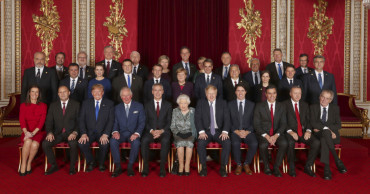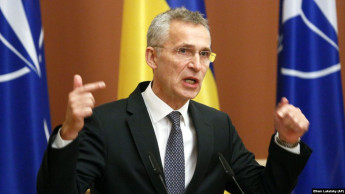NATO chief
New NATO Chief Rutte says alliance ‘needs to go further’ in support for Ukraine
NATO’s new Secretary General Mark Rutte on Tuesday said the alliance “needs to go further” to support Ukraine in its fight against a Russian invasion and accused Moscow of dangerously escalating the conflict by bringing in thousands of North Korean troops.
“In pursuing its illegal war in Ukraine, Russia makes use of North Korean weapons and troops, Iranian drones and Chinese dual use goods for its defense industry,” Rutte said while on a visit to Greece. “This is a dangerous expansion of the war and a challenge to global peace and security.”
Rutte, a former Dutch prime minister who took over as NATO chief last month, met Greek Prime Minister Kyriakos Mitsotakis in Athens and thanked him for Greek support for Ukraine that includes weapons and ammunition, as well as training for F-16 pilots and technicians.
“Our support for Ukraine has kept them in the fight, but we need to go further to change the trajectory of the conflict,” Rutte said.
Greece spends over three per cent of its gross domestic product on defense, above the two per cent committed minimum for NATO members, and is seeking a change in European Union budget rules to allow for greater military spending. It also wants to help create a common European air defense system.
“We agree on one of the fundamental priorities for all allies: the need to strengthen our collective defense, a goal that requires a strong defense industry with significant investments,” Mitsotakis said, adding that Athens backed “a more functional relationship between NATO and the European Union, to further strengthen the European pillar of the alliance.”
The week that upped the stakes of the Ukraine war
Europe’s NATO members have been discussing plans to boost defense investments for months due to the ongoing war in Ukraine and uncertainty surrounding the incoming U.S. administration following the election victory of President-elect Donald Trump.
Rutte’s visit to Athens follows meetings with Trump in Florida and Turkish leaders in Ankara Monday.
Rutte also held talks with Greece's Minister of Foreign Affairs George Gerapetritis and Minister of Defense Nikos Dendias.
Several thousand protesters marched through central Athens in opposition to the NATO chief’s visit. The largest rally was organized by a Communist-backed trade union, at which protesters chanted: “Give us money for health and education, not NATO killers.”
1 year ago
NATO chief says Afghan forces can cope alone
NATO has helped provide security in Afghanistan for almost two decades but the government and armed forces in the conflict-torn country are strong enough to stand on their own feet without international troops to back them, the head of the military organization said Thursday.
NATO took charge of security efforts in Afghanistan in 2003, two years after a U.S.-led coalition ousted the Taliban for harboring former Al-Qaeda leader Osama bin Laden. Fewer than 9,000 troops remain, including up to 3,500 US personnel, and they are scheduled to leave by Sept. 11 at the latest.
“I think that the Afghans, they also realize that we have been there now for 20 years and we have invested heavily in blood and treasure in Afghanistan,” NATO Secretary-General Jens Stoltenberg told The Associated Press, aboard a U.K. aircraft carrier involved in wargames off the coast of Portugal.
Also read: Afghan forces demoralized, rife with corruption
“Afghanistan has come a long way, both when it comes to building strong, capable security forces, but also when it comes to social and economic progress. At some stage, it has to be the Afghans that take full responsibility for peace and stability in their own country,” Stoltenberg said in an interview.
But as NATO troops leave, much of the country stands as contested ground. The government in Kabul holds hold sway in towns and cities, but the Taliban dominate the countryside. Some of the heaviest fighting this year took place just this week, in Laghman province in the east.
Stoltenberg said that NATO countries would continue to support Afghanistan through civilian experts who will help to advise government ministries, by funding the security forces and with support for slow-moving peace talks between Kabul and the Taliban.
He said that NATO is also “looking into the possibility of providing some training out of country for the Afghan security forces, but no final decision has been taken.”
U.S. military leaders are still grappling with how best to carry out President Joe Biden’s order to withdraw all American troops from Afghanistan by September while helping Afghan forces and monitoring the threat that prompted the U.S. invasion of the country 20 years ago.
Biden and Stoltenberg will meet with the other leaders of the 30-nation military alliance on June 14 to usher in a new era in trans-Atlantic ties after four tumultuous years of the former Trump administration. The other big issue will be Afghanistan, although no Afghan leaders are due to attend the Brussels summit.
Also read: Afghans who helped the US now fear being left behind
Asked about the impact of leaving Afghanistan without the security guarantee that has helped keep the Taliban at bay, Stoltenberg conceded that “there are risks entailed to the decision of ending NATO’s military mission in Afghanistan. We have been very transparent and clear-eyed about that.”
“At the same time, to continue to stay means that we will also have to take some risks; the risk of more fighting, the risk of being forced to increase the number of troops there, and the risk of remaining with a (military) mission,” he said.
Many of the international troops in Afghanistan will already have left by the time the leaders meet next month. America’s allies in Europe, plus Canada, rely on U.S. logistical and transport help to operate in Afghanistan and could only follow once Biden announced the withdrawal.
Many officials have expressed concern that once the U.S. leaves, the government and its armed forces will be quickly overrun by the Taliban. Violence has steadily mounted in recent months as the drawdown gathered pace.
It remains unclear what level of security might be needed, and who would provide it, to protect international embassies spread around the capital Kabul. The city’s airport, the main international gateway to Afghanistan, and the route to it must also be protected.
Stoltenberg said that NATO plans to provide financial support to keep Kabul airport up and running, but — just a few months before the alliance ends its biggest, costliest and most ambitious mission ever — the details of how all this might play out remained unclear.
4 years ago
NATO chief rejects criticism as infighting roils alliance
NATO Secretary-General Jens Stoltenberg on Wednesday rejected French criticism that the military alliance is suffering from "brain death," and insisted that the organization is adapting to modern challenges.
6 years ago
Trump to host NATO chief at White House next week
U.S. President Donald Trump will discuss burden-sharing and security issues with NATO Secretary General Jens Stoltenberg next week in Washington D.C., the White House said in a statement on Saturday.
6 years ago

.jpg)




